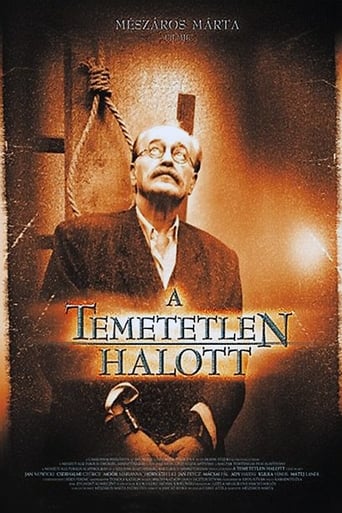

It's not great by any means, but it's a pretty good movie that didn't leave me filled with regret for investing time in it.
... View MoreI cannot think of one single thing that I would change about this film. The acting is incomparable, the directing deft, and the writing poignantly brilliant.
... View MoreJust intense enough to provide a much-needed diversion, just lightweight enough to make you forget about it soon after it’s over. It’s not exactly “good,” per se, but it does what it sets out to do in terms of putting us on edge, which makes it … successful?
... View MoreThe storyline feels a little thin and moth-eaten in parts but this sequel is plenty of fun.
... View Morea film for memory. and for understand a period in its basic aspects. useful. impressive. necessary. and this fact, the portrait of Imre Nagy, the delicate way to create the realistic portrait of a time are essential virtues. sure, it is not perfect. but it represents a beginning. to remember. to not ignore the legacy of a fight for virtues important more for present than for define the past.a homage. and the desire to use the right tone for show the pieces defining a dark world. for many reasons, it is a good idea to see it.
... View Moreit is not a film about a man or a event. it is only picture of a state of mind. nothing else. the silhouette of Nagy Imre, the images, music, acting, tension, accounts of details are pieces of this purpose - authentic picture of a society feelings. so, it is impressive work of a great director about a profound Hungary. a Hungary who can be any other country of Europe under Communism. therefore, the message is so realistic. because the testimony is part of a lot of existences. because courage, sufferance, ideals, need of real values are bones of each society. for me, it is reflection about absurd cruelty of a time.homage to forgotten sacrifices. and subtle warning. or, only a letter from a hero out of every definitions.
... View MoreI think this movie is pretty useless. It does not give you any perspective on the revolution of 1956. The viewer does not get any idea on the background of the revolution. The film pretty much concentrates solely on the life of Imre Nagy, the prime minister of Hungary during the revolution. You cannot learn too much about him having watched the movie either, since it only shows brief, emotional clips about his life before 56. We do not learn how this man coped with the terrors of Stalin while he was living in Russia, and that he was an agent of Cheka the predecessor of KGB. The film also does not say anything about how many times Nagy withdrew his political opinion and corrected his former point of view under pressure from his comrades and the Party. All in all, until 56 Nagy was pretty much like any of his comrades from the communist party's elite, but strangely, in 56, even after the revolution had been crushed, he was not prepared to make another compromise, or even plead guilty which may have saved his life. This contrast in his personality that makes him interesting, but the film does not show any of these conflicts within Nagy's personality. Overall this movie does not provide too much information about the 1956 revolution, neither does it show Nagy's true personality, and how his view on communism evolved over his life, and worst of all it is quite boring as well.
... View MoreNo question this film is visually beautiful, historically authentic and the theme itself is dealt with humanly and with much humility. Jan Nowicki was a truly authentic Nagy Imre and I guess he will be praised much for this role not only in Hungary. However, I find it quite sad that some of the dialogues were extremely constrained and artificial. Mácsai's part is totally unrealistic for instance, not to mention the parts of the grandchildren (brrr...). The whole project is so important to so many in Hungary that Mészáros Márta (an otherwise excellent director) should have had a little more attention in accuracy and authenticity in the dialogues as well. (My feeling is that Jancsó shouldn't have been allowed close to the script.)
... View More